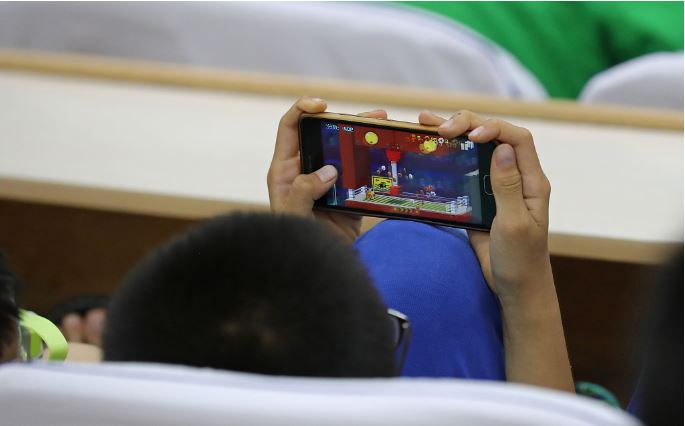
From the People’s Daily app.
This is Story in the Story.
The popularity of smartphones continues to skyrocket with estimates now putting them at two billion worldwide, making them the most widely used electronic devices on the planet.
It seems that almost everyone has one these days, particularly teenagers, and that trend isn’t just limited to the west. China too is seeing an explosion in the number of teens and tweens with smartphones.
In fact, the use of smartphones has become so prolific that students in a city in central China are no longer allowed to bring their phones and other smart devices to school after local education authorities issued a new regulation in November.
The rules by the education bureau in the city of Xiangtan, Hunan Province, also called on primary and secondary school students to use their Internet-connected devices no more than 30 minutes a day, while turning education institutions into smartphone-free venues.
Phones with the basic function of making calls as well as watches are allowed during recess for students to stay in touch with their parents only if they file an application with the school.
Today’s Story in the Story looks at what is being done to address children’s addiction to their phones.

A boy plays a video game on his mobile phone. (Photo: China Daily)
Some 68 percent of primary and secondary school students in China own a smartphone, according to a report cited by China Youth Daily.
From reading news and chatting with friends, to ordering food, buying clothes, playing games and hailing cabs, life in China has been made more convenient through smartphones. But that comes with a sense of attachment to the devices among children, constant distraction for students and the risk of premature exposure to age-inappropriate material.
On China's social media many netizens expressed belief that children can easily fall into the trap of digital addiction, damaging their health and school performance.
"The mere presence of one's smartphone consumes attention even when it's not being checked," said one user on China's platform Weibo.
However, other people held the opinion that smartphones serve important functions in the digital era. One part of a good education for students today is to teach them how to wisely use technology to learn, communicate, and work with ideas.
Chinese tech giant Tencent launched a new program in its latest effort to help the country's increasingly digital-savvy teenagers develop healthy online habits and use the internet as a useful tool.
The company unveiled the Digital Natives Action (DN.A) program, a joint initiative with government authorities, universities, industry experts, and third-party organizations to help teenagers better navigate digital platforms.
Tencent Vice-President Yao Xiaoguang in an open letter called on teenagers to put down their electronic devices and spend at least one hour a week with their parents to enjoy some quality time with family.

Students use their smartphones while walking in a mall in Beijing, on January 26, 2018. (Photo: CGTN)
According to a survey conducted by volunteers from Yangzhou University in over 400 rural families in Guizhou, Anhui and north Jiangsu province, playing with mobile phones for long periods of time has become an epidemic among rural teenagers.
Some children are "eating, walking, and even sleeping with cell phones in their hands," the report said.
Wang Yuxuan, a student in Yueyang, Central China's Hunan Province, said that almost everyone in his class has a smartphone. "We are excited to gather for a group online game. We can start one very quickly as soon as we get out of the teacher's sight."
The boy's father said his son stares at the mobile phone without talking to anyone at all, only taking a break for eating and sleeping. Even if his grandparents confiscate the phone, it won't take him long to get it back.
Addiction to mobile phones can lead to a number of problems. Zong Chunyan, a consultant at Yangzhou University's mental health center, said the overuse of mobiles can result in children having less effective communication with their parents and peers, as well as an unsociable personality.
Physically, staring at a mobile phone screen for a long period is likely to cause impaired vision, cervical spondylosis and other problems.
But in the eyes of Zhang Yu, principal at a primary school in Southwest China's Guizhou province, hidden risks such as the decline in academic performance, inattention and exposure to inappropriate information are even worse.
"I think effective cooperation between families and schools is the most useful tool to break children's dependence on cell phones," said Zhang.
(Produced by Nancy Yan Xu, Brian Lowe, Lance Crayon and Da Hang. Music by: bensound.com. Text from CGTN, China Plus, China Daily and Global Times.)


